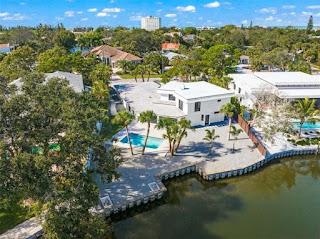Case Study- Six Townhouses in Miami New Construction
We recently funded a new construction project for six
luxury condos in Miami Beach, FL. The total financing was $2.26M.
Here is how this deal went from start to finish.
Origination-
This deal was brought to us by a broker that we know very
well. We've done several deals with this broker. When it comes to new
construction deals, especially ones with multiple units, experience and knowing
who you're dealing with is key to a successful transaction.
One of the first things we do when a new construction deal
is presented to us is request the borrower's experience file. We
obviously check to make sure the asset class and location is a fit and the loan
amount is within our limits. But we make sure the broker or
borrower sends the experience file. If they don't have recent (within 36
months) and relative experience, it's a hard NO and we move on. By
relevant experience, we need either new construction of similar asset classes
or VERY heavy rehab deals (at least 5). New construction deals have a
very high degree of execution risk, and the chances are very high that a novice
will run into unforeseen issues. This is basic risk management for new
construction deals.
Loan
Structure
Like
most real estate financing, new construction deals can either be structured as
a purchase or a refinance. Purchase transactions for new construction
deals can be a bit risky because most of the time you're financing raw land
without approved permits. This can be super risky because no lender wants
to have to foreclose on raw land. It can be very hard to monetize. We
prefer to finance refinances, because in a refinance, the borrower will have
had time to get the permits and approvals necessary for building. That's
what happened in this case. Our borrower purchased the land for cash a
few years back and then spent the time getting the permits and plans ready to
go. We like it when the borrower is able to purchase the land with cash
because it shows they have their own capital and don't need loans for every
part of the deal.
In this
case, our borrower purchased the land for $1.0M a couple of years prior.
When we evaluate recently purchased land, with in a couple years of purchase or
so, we always look at the borrower's cost basis and not the current
value. We never want our loan to exceed 80% of the borrower's cost in the
deal. Always make sure the borrower has cash in a deal. That keeps
the borrower motivated to stay on track. When we structured this deal, we
gave the borrower an initial advance of $300,000 plus the construction cost of
just under $2 million. We liked this structure as it gave the borrower
some money at closing to cover closing costs and start the construction, but yet
the borrower still had $700,000 of cash in the deal.
Additionally,
since this deal was for the construction of six different townhomes, we
structured this loan as one blanket loan for six different properties. This
will allow the borrower to sell the units off one-by-one.
Underwriting
Here are
the major items we look at when underwriting a file:
Basics
of the Deal: Location, scope, and profitability. The
deal must make sense! Underwriting 101.
Sponsor/Borrower:
Credit/Background, liquidity, experience are the three major items. Need
to make sure your borrower pays their bills on time, has cash to support
the project, and has the experience to complete the project. In this
case, everything checked out.
Project
Feasibility and Budget: In the most basic terms,
you need to make sure that the budget presented will get the project
completed. We always do a basic review to make sure all the major line
items are in budget as well as make sure the $/sqft estimate makes sense. If a
borrower has a budget that leaves out major line items or the $/sqft is way
high or low, be very suspicious. That's a HUGE red flag. We
always order a 3rd party feasibility study for any new construction or heavy
rehab deals.
Valuation:
Last but certainly not least is valuation. When it comes to valuing
raw land, cost basis is very important. Land can be hard to comp and it doesn’t
always trade often. We always factor in cost basis. If a borrower paid
$100k for it last year, but now the appraiser says it's worth $1m, we know
there is an issue. When a borrower says how much his land is worth, our
next question is always..."What did you pay for it?".
Appraisals are important, but they're just opinions.
For new
construction or value-add deals, we always get the After Repaired Value
included in the appraisal. This is the completed value of the project
based on the plans and budget submitted. Our total loan, including
construction, is based off the ARV value.
Miscellaneous:
Here are some of the additional items that always have to be reviewed:
title, plans/permits, insurance, entity docs and borrower ID.
Closing:
Once the
underwrite is completed, we then engaged our attorney to close the deal. Since
we structured this deal as a blanket loan, we had to give different release
prices for each unit. This is very important as it gives us extra
protection as the borrower sells off the units. This loan closed without
any hiccups and the borrower was able to start construction straightaway.
Stay tuned
for more updates from this project!
.jpg)
.jpg)


Comments
Post a Comment